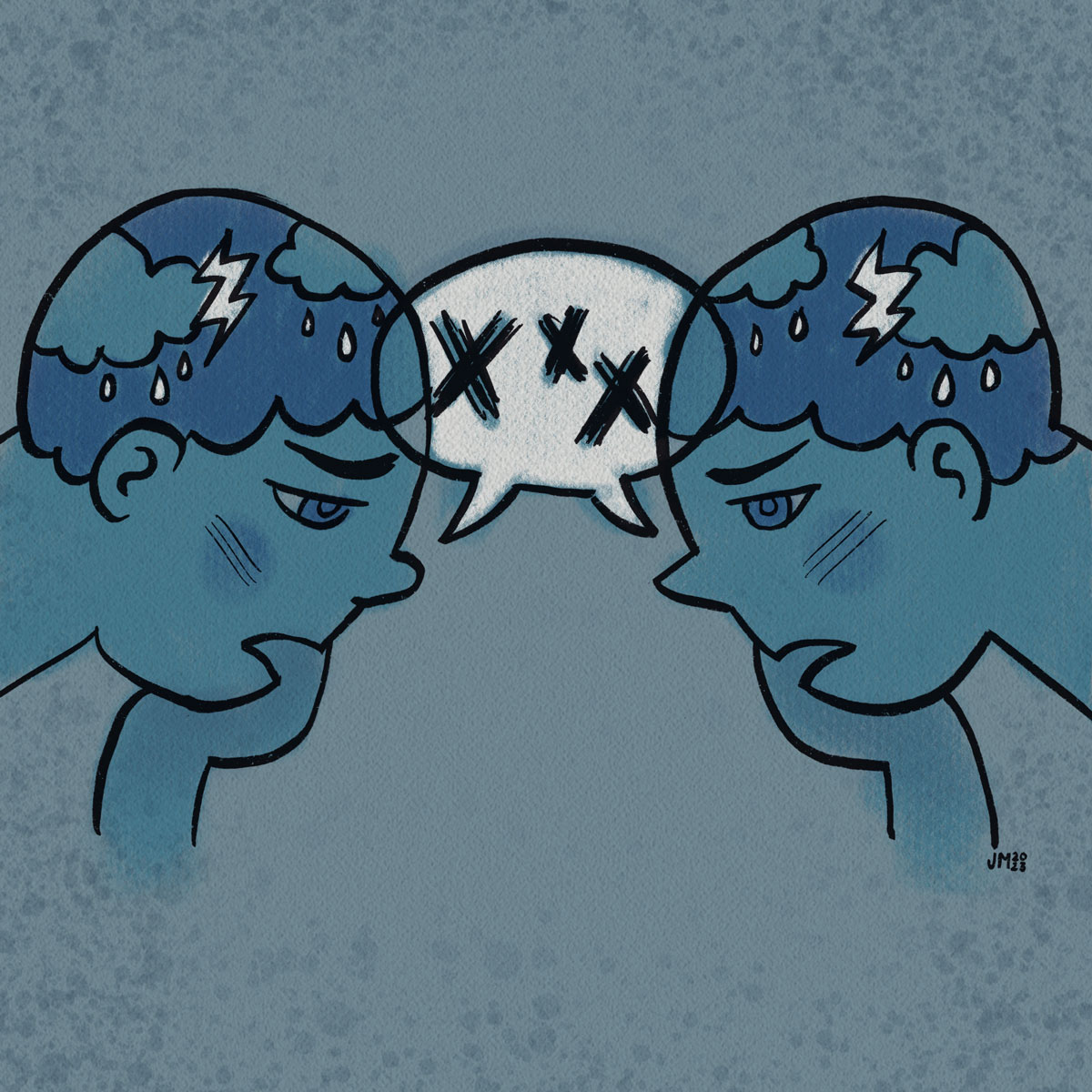Sometimes it’s better to stop talking about your problems.
Lots of us do it. Something happens that confuses or upsets us, and we rush to hash it out with friends. We may act like sleuths investigating a crime, carefully inspecting each nugget of information for clues, as if we’re constructing an evidence board with red strings connecting all the pieces.
What did he really mean when he responded, “K, sounds good”?
Why did she take 2 days to message me back?
Why did my boss uninvite me from that meeting?
He says he likes me, but he barely spoke to me at the party…
While it may feel good in the moment, repeatedly discussing negative feelings or problems can make you feel worse and keep you from figuring out practical solutions to improve your situation.
Read on to learn more about co-rumination and what to do instead.

What is co-rumination?
When we’re going through a rough time, it’s common to mull over what happened, what might happen, and what it all means. I lost my job, now what? Why me? What does this mean for my future?
Sometimes, this process is helpful—it can help us think things through, weigh our options, and figure out new solutions to our problems.
However, if we get stuck thinking about the negative aspects of the same situation over and over again, that’s called rumination. If you’ve ever repeatedly replayed a memory of yourself saying or doing something unfortunate, you know what it is to ruminate. Oh man, why did I say that?! So thoughtless. They must think I’m a jerk…
Co-rumination operates similarly. Instead of mulling things over internally, we repeatedly discuss them with someone else, dwelling on negative aspects or thoughts and feelings rather than finding solutions.
Why we co-ruminate
Seeking and receiving social support is an important part of maintaining physical and emotional health. Talking to a loved one or even an acquaintance about our feelings and concerns can feel really good. Hashing out our problems together can make us feel supported and increase our relationship closeness.
However, when discussing our problems turns into co-rumination, it may also increase our likelihood of experiencing symptoms related to depression and anxiety and keep us from actually doing something to improve our situation.
How to stop co-ruminating
1. Spot the signs
It can be difficult to tell the difference between sharing and ruminating, but here are some pointers.
If you find yourself talking about the same experience over and over again, especially if it involves difficult emotions (e.g., anger, sadness, envy), ask yourself:
- Have I spoken about this problem before? Is it new?
- Do I have new information that I haven’t shared?
- Am I speculating about what might happen?
2. Know your patterns
- Which topics do you tend to ruminate about?
- Are there certain people you tend to co-ruminate with?
- Are there specific situations in which it often happens?
3. Ask your friends for help
It’s useful to discuss co-rumination with the people with whom you tend to do it. You can explain that you’ve noticed you tend to dwell on negative thoughts and situations and that you’d like their help in pointing out when you start to sound like a broken record, repeating the same negative story over and over.
This may allow you to have a larger discussion about the kinds of support that are helpful to you and how you can be a more supportive friend or partner to them.
4. Play a game of “catch”
Noticing that you’re ruminating may be half the battle. The more you focus on recognizing the difference between co-rumination and problem solving, the easier it’ll get to make that shift. Be gentle with yourself and think of it as a game – Oh, I’m doing it again. Good catch!
5. Switch to active problem-solving
- Is there anything you can do right now to improve the situation?
- Is there a small step you can take to make things better?
It’s generally the case that taking any kind of step toward improving a situation is more helpful and empowering than simply venting about it.
That being said, there will be situations in which you have little control. In those cases, it may be helpful to reflect on ways to accept or cope with your situation or what you might do to keep similar situations from happening in the future.
6. Develop other coping strategies
Co-rumination is often a means of trying to cope with distress. If you attempt to stop co-ruminating without developing other, more helpful coping strategies, you may feel lonely and upset.
When you’re feeling upset about a situation in your life, these strategies may help:
- Do something to calm your emotions (go for a walk, try a deep breathing exercise, write down all of your thoughts)
- Come up with possible solutions and weigh their pros and cons
- If all else fails, engage in healthy distractions (watch a movie, take a bath, etc.)
It’s important to continue seeking social support and sharing your thoughts and feelings. However, instead of calling a friend to rehash the terrible thing that happened yesterday, perhaps you can try a new activity together, tackle a shared goal, or find another way to spend time together that encourages more constructive conversations and promotes more positive feelings.
7. Find balance
There will still be times when you just really need to call a friend and let off some steam. There’s nothing wrong with that! Just pay attention to how much space it takes up in your relationships and how it makes you feel afterwards. Work toward finding a balance that feels good long term.
Next Steps
If you or someone you love would benefit from talking to a mental health provider in Tennessee, contact Athena Care.
One of our Care Coordinators will help you get the care you need.

Rachel Swan, MS
Editor
Rachel has a Masters of Science in Clinical Psychology from Vanderbilt University, where she spent 16 years as a Research Analyst in the Psychology and Human Development Department.


